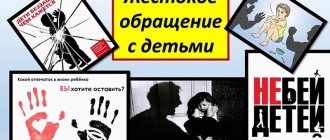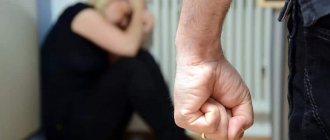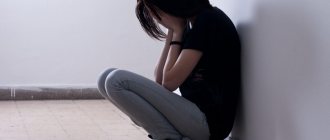24.08.: 2658
Child abuse in the family. Respect for the rights of the child to protection from all forms of violence
Raising children requires a lot of strength, endurance and patience from parents. They are brought up differently. Beatings, intimidation, and humiliation are often used even in prosperous families. Parents deprive the child of initiative, communication and the right to choose, explaining their actions by the need to maintain discipline, since other methods of education do not lead to the desired result. Often adults realize that they are going too far.
In dysfunctional families, where the level of culture is lower or the parents abuse alcohol, the situation is much worse - cruelty becomes the norm here.
“...The child, due to his physical and mental immaturity, requires special protection and care, including adequate legal protection both before and after birth and must be protected from all forms of neglect, cruelty and exploitation.”
— excerpt from the Declaration of the Rights of the Child, adopted by the UN General Assembly on November 20, 1959.
Child abuse
- this is physical or mental violence against him.
There are physical, sexual, emotional (mental) violence and neglect of the basic needs of the child.
Physical violence
- this is direct assault: beatings, slaps, bites, burns, shaking (when an adult shakes him violently). According to the Center for Social and Forensic Psychiatry named after. Serbsky, about 2.5 million children under 14 years of age are beaten by their parents, about 50 thousand of them run away from home to avoid another attack. In addition, about 30-40% of crimes occur within the family, 50% of them affect children (they become victims or witnesses of crimes).
Sexual violence
(corruption) - the involvement by adults of minors, with or without their consent, in sexual activities, in prostitution. Showing pornography is also sexual violence.
Psychological abuse
- actions that cause fear in a child, as well as insults, humiliation, rejection, accusations, and violence against people and animals committed in his presence.
Neglecting Basic Needs
- lack of basic care for the child.
Legal responsibility of parents for cruelty to children
Child abuse is a crime, and there are several types of liability for these actions in Russian legislation.
Criminal liability
For all types of physical and sexual violence against children, as well as under a number of articles for mental violence and neglect of the basic needs of children, lack of care for them, criminal liability is provided (Articles 110-113, 115-119, 124, 125, 131 -135, 156, 157 of the Criminal Code of the Russian Federation).
Administrative responsibility
Neglect of the basic needs of a child and failure to fulfill responsibilities for his maintenance and upbringing are subject to administrative liability in accordance with the Code of the Russian Federation on Administrative Offenses (Article 5.35.).
Civil liability
For cruel treatment of a child, parents or persons replacing them are held accountable in accordance with the Family Code of the Russian Federation (Article 69 - deprivation of parental rights, Article 73 - restriction of parental rights, Article 77 - removal of a child if life or health is threatened).
Number of impressions: 2658 Date modified: 08/24/2021 09:29:33
What is this?
What constitutes child abuse? Article 156 of the Criminal Code defines sanctions for such an attitude of adults towards a person who is under 18 years of age.
Child abuse refers to the use of physical and psychological violence against a child by adults. In the first case, the child can be beaten by his own parents, but they do it unnoticed by the people around him. Therefore, if citizens constantly hear the screams and plaintive crying of a child behind the wall, then it is best to inform the local police officer or call the guardianship authorities of your city.
Psychological violence manifests itself in the constant humiliation of the child and insult to his dignity (for example, the use of obscene language towards the baby).
Thus, in the first and second cases, the child receives severe psychological trauma, which has the most negative impact on his future life.
Consequences for the child's life
Regardless of the severity of the harm caused to a minor, it will leave imprints on his personality, preventing him from developing normally and fully.
Consequences include violations:
- psychological;
- physiological;
- of an emotional nature.
Violations manifest themselves in the form of inability to communicate with others, isolation, inability to control one’s feelings, and low self-esteem. If the information a child receives tells him that he is worthless and that he is worthless, that is what he will think when he grows up. Anxiety is a constant companion for those who have lived in fear since childhood. Any important decision in life will cause fear of falling and failure, even if there is no reason for this.
In such cases, intervention, including medical intervention, is necessary. Without timely help, the child develops into an emotionally depressed personality, nervous, and distrustful of others.
Why does this happen
Currently, the problem of child abuse is quite acute. In fact, it shouldn't exist at all. Nevertheless, this problem also exists in many even very decent and exemplary families, where children experience emotional discomfort. In addition, many people, after growing up, share information about their “unhappy” childhood with their acquaintances and friends.
How does child abuse manifest itself? Scientific articles by many modern specialists, psychologists, and public figures only say that such an attitude towards children is associated with an emotionally unbalanced state. In addition, many parents take out their anger on a child who is not to blame for anything. Why should a child endure bullying from adults, even if he was an unwanted child in the family or one of the parents simply abandoned him? This shouldn't happen. Therefore, the birth of a child should be a thoughtful and balanced decision of both parents. After all, the birth of a child and his upbringing is a very big responsibility.
Where to contact?
The first who can notice such signs and what is wrong in the family of an individual child are close relatives and employees of educational institutions. If one of the persons identifies signs of abuse of a minor, you should immediately report this to the head of the school, who, in turn, is obliged to contact the guardianship and trusteeship authorities (a telephone call, after which 1 day is given to file a written complaint describing the case). In response to the notification received, employees of the above-mentioned service are obliged to send an inspection to the child’s residential address in order to check the child’s living conditions and upbringing.
The inspection commission includes the following persons:
- an employee of the educational institution where the minor is registered;
- representative of the guardianship and trusteeship authority;
- in some cases, an internal affairs officer is involved.
The results of the examination of the minor’s living conditions are included in a special act.
Having a problem? Call a lawyer: +7
— Moscow, Moscow region
+7
— St. Petersburg, Leningrad region
The call is free!
The results of the investigation must be documented in writing, information about what happened must be recorded, an inspection report and other available papers must be attached, and a package of documents must be sent to law enforcement agencies or the prosecutor's office. The relevant authorities will definitely respond.
The head of the educational institution also sends all paperwork documents to the commission on juvenile affairs, as evidence of the fact of violence against the child.
Protecting children from abuse in the family is also the responsibility of close relatives if they testify to this fact. You can also contact the prosecutor's office, law enforcement agencies, attaching evidence in the form of messages, video recordings. You can complain to the class teacher or school management.
How to recognize child abuse?
The longer a minor is exposed to violence, the harder it will be to help him in the future. In the early stages, if violence is detected, the victim can be helped and his mental health restored. But over the years, the problem gets worse, the victim does not complain to the relevant authorities, and the culprit remains unpunished.
It is not always easy to recognize domestic violence. More often it is of a hidden nature, in addition to which the little ones are also intimidated and threatened, not allowed to answer questions from friends about obvious signs of aggression and violence.
Despite the above, there are characteristics in the child’s behavior that indicate a problem.
So, signs of child abuse:
- refusal of new things due to fear of making a mistake;
- intimidation, lack of attachment to family members, in particular, parents, guardians, etc.;
- behavior is changeable, one of the following traits is constantly manifested - seriousness, aggression, passivity, etc.;
- diffidence;
If you notice such manifestations, you must immediately contact law enforcement agencies. In addition to the characteristics presented above, the adult generation may commit violations against the life and health of children, sexual integrity, neglect of educational measures, etc.
Signs of physical violence: beatings, torture. Sexual violence can be identified through the behavior of a minor. Signs are not always visible on the victim’s body. Signs of neglect are manifested in the presence of dystrophy, pediculosis, etc.
Common Stereotypes
Preventive measures to prevent domestic violence will be impossible if you do not know how things really are. People are often confused about domestic violence and have misconceptions about the reality of what is happening there.
Below are common stereotypes associated with domestic violence and how to debunk them:
- It is a common belief that children suffer directly from physical abuse . This information is not justified, since the psyche of a minor has not yet formed, and he suffers from insults and neglect to the same extent as from physical violence;
- The next myth is that only those who grow up in dysfunctional and socially unprotected families suffer. Based on this, in apparently prosperous families, children suffer, and no one sees this because of the prevailing stereotype that everything is fine with them;
- Some people think that only those who can offend minors are those who themselves have gone through suffering and who were hurt in childhood. Allegedly, the fact is explained by the fact that their psyche is crippled. But there is some evidence that people who were neglected or bullied as children become those who want to protect the younger generation and provide the support they need.
Thus, the problem of violence and cruelty in the family requires a comprehensive approach and attention from the public. Only through the joint efforts of the family, child protection agencies, law enforcement agencies and employees of educational institutions, this problem will not be so pressing. For many families, it is enough to lend a helping hand in time so that they can rehabilitate their relationship with their children.
For any questions, please contact our lawyers through this form!
Who can be punished
For cruel treatment of children, Article 156 of the Criminal Code establishes the punishment that the following persons will bear:
- parents, as well as guardians or trustees (since the latter, instead of mom and dad, are involved in raising a minor child and treat him poorly);
- teaching staff or other employees of educational and medical organizations;
- employees of special services who are required to supervise children.
Thus, not only the legal representatives of children, but also other persons whose professional responsibilities include caring for and supervising minors can be found guilty of this crime.









